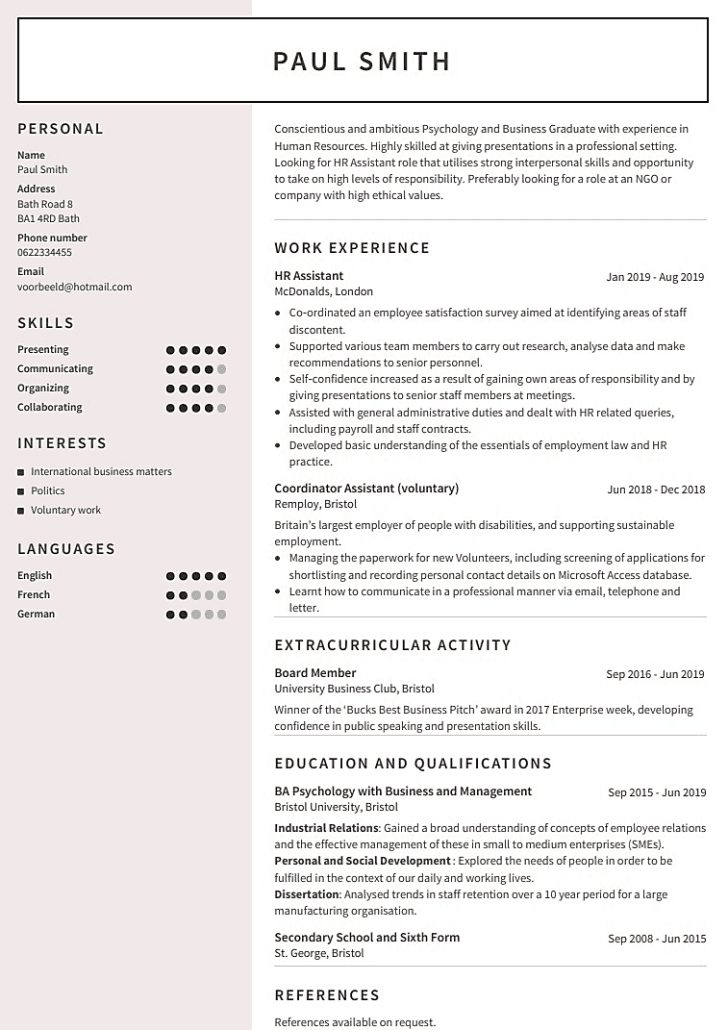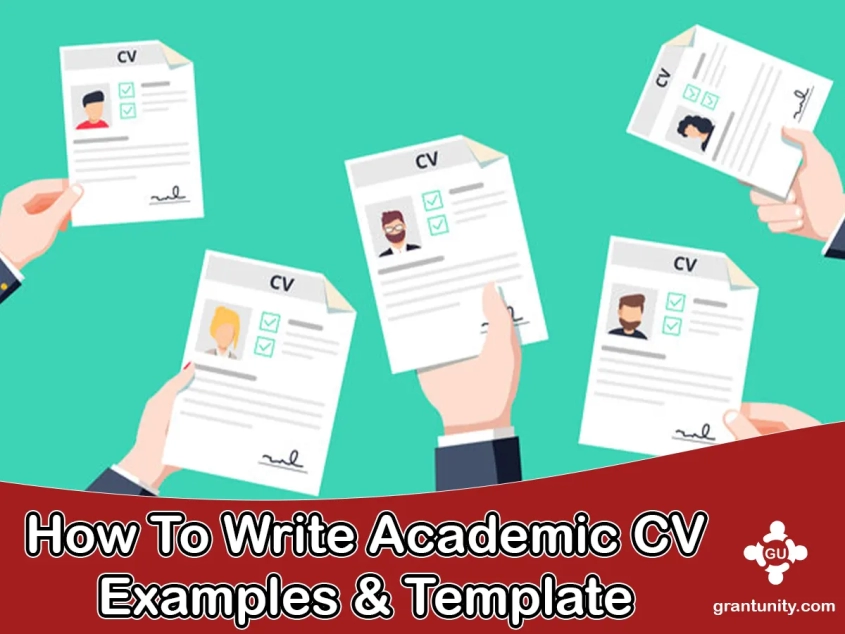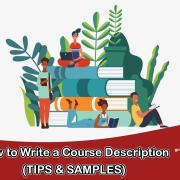How To Write Academic CV: Curriculum Vitae Examples & Template
Are you a student or recent graduate preparing to write your first resume? Even if you do not think you have any work experience to include, you can still create an excellent CV that highlights your strengths and skills. Once you graduate from college or university, the job market is competitive, as any recent graduate attests. This is why creating a professional resume requires much effort. Making your CV presentable and simple to read is crucial, regardless of whether you’re looking for a part-time job while in school or want to get your first job in the field you have been trying to break into. Continue reading to learn how to create the ideal CV for your needs.

What Is Curriculum Vitae or CV?
A curriculum vitae (CV) is a detailed document that provides a comprehensive summary of an individual’s academic and professional history. It is typically used in academic and research fields, as well as in applications for certain types of jobs, particularly those in academia, science, medicine, and other research-based fields.
A CV typically includes information about an individual’s educational qualifications, including degrees earned and academic achievements, as well as their employment history, including work experience, job titles, and responsibilities. It may also include information about research experience, publications, presentations, and other academic achievements.
In addition to these sections, a CV may also include information about an individual’s professional affiliations and memberships, awards and honors, relevant skills and certifications, and other relevant information that highlights their qualifications and achievements.
Why Do Students Need A CV?
Students may need a CV for several reasons, including:
- Applying for jobs: When applying for internships, part-time or full-time jobs, many employers require a CV along with a cover letter. A CV can help the employer understand the student’s qualifications, skills, and experiences.
- Applying for scholarships: Many scholarships require students to submit a CV along with their application to provide a summary of their achievements, experiences, and qualifications.
- Applying for graduate programs: Students applying for graduate programs, such as Master’s or Ph.D., may need to submit a CV along with their application to showcase their academic and research experiences.
- Applying for research or academic positions: In academic and research fields, CVs are often used to apply for positions such as research assistant, teaching assistant, or postdoctoral positions.
- Networking: A well-written CV can also be used to introduce oneself to potential mentors, colleagues, or collaborators in the academic and professional fields.

Difference Between a Student CV Different from Other CVs And Resumes?
A student CV differs from other CVs and resumes in a few ways:
- Focus on education: A student CV focuses heavily on the individual’s academic achievements, including educational qualifications, academic honors, and relevant coursework. This is important for students who may have less work experience than other job seekers.
- Emphasis on extracurricular activities: A student CV may also include information about extracurricular activities, such as volunteer work, internships, and other relevant experiences outside the classroom. These activities can help to demonstrate the individual’s skills and experiences outside of their academic work.
- Limited work experience: Unlike a traditional CV or resume, a student CV may not have a lengthy work history or extensive professional experience. Instead, the focus is on academic achievements and relevant skills and experiences.
- Emphasis on skills: A student CV may also place more emphasis on skills, such as research skills, communication skills, and computer skills, to demonstrate the individual’s qualifications for a particular opportunity or position.
How to Start Writing a CV as a Student
Here are some steps to help you start writing a CV as a student:
- Review examples: Before you start writing, it’s helpful to review examples of student CVs to get a sense of what information to include, how to structure the document, and how to format the content.
- Identify your strengths: Think about your strengths, skills, and experiences that are most relevant to the opportunity you are applying for. This may include your educational qualifications, research experience, extracurricular activities, volunteer work, or other relevant experiences.
- Decide on the format: Choose a format that works best for you, depending on your skills, experience, and the opportunity you are applying for. A chronological format may work if you have a clear and strong work history, while a functional format may be better if you want to highlight your skills and experiences.
- Include a header: Your header should include your name, address, phone number, and email address.
- Write a personal statement: This section is a brief introduction of yourself and your career aspirations. You can highlight your career goals, your interests, and your relevant skills.
- List your educational qualifications: Start with your most recent educational qualification and work your way back. Be sure to include the name of the institution, the degree you earned or are pursuing, your field of study, and the dates you attended.
- Highlight relevant experiences: This may include internships, volunteer work, research, or other relevant experiences that demonstrate your skills and abilities.
- List your skills: List your relevant skills, such as research skills, computer skills, language proficiency, and other relevant skills.
- Provide references: If possible, include references who can speak to your academic or professional abilities.
- Proofread and edit: Make sure to proofread and edit your CV for spelling and grammatical errors, and to ensure that the formatting is consistent and professional.
What Should You Start including In the CV?
Start with your name and contact information before moving on to your profile, educational background, and any professional experience you may have gained through internships or part-time jobs. Although you can occasionally use bullet points to list your exam results, it is best to write in whole sentences. If you currently hold a degree but have been pursuing a master’s, make sure to list your current degree information and the institution of higher learning where you received it. Then go back to the A-level, GCSE, and other results. A proper CV must contain at least the following:
1-Personal Details
- Full name
- Place of residence
- Phone number
- Email address
- LinkedIn profile (if representative and up-to-date)
2- Profile Summary:
A brief but impactful self-introduction. Explain who you are, what you are good at, what you are seeking, and what your goals are in two to three sentences. See the below example:
“Student in Stonebridge College’s sixth form. Practical work experience includes summer catering work in restaurants and weekend retail work that includes cash handling. I want to begin a career in business with work that will help me advance my business skills and incorporate customer service.“
3-Work experience:
Describe the positions and employment history you have already had. Briefly describe your duties, obligations, and accomplishments. Try to concentrate on transferrable talents that will enable you to succeed in different occupations.
4- Education and qualifications:
your most recently completed study should be first. Include specifics about your degree, such as skills you learned, projects you worked on, and your unique position and accomplishments, if they are pertinent to the job you are looking for.
Recommendation For Students with Little Or No Professional Experiences
Use the knowledge you already have to try to demonstrate your skills on your resume because you cannot create the experience out of thin air. You can use your involvement in clubs and social groups both inside and outside of college to illustrate, for instance, your organizational, person-centered, and communication abilities. Avoid the temptation to claim that you have employment experience that you do not. If you claim to have experience in a field but do not, you will probably find out rather soon during an interview. Whatever work you have done—even if it was a seasonal job—is pertinent and shows that you are capable and motivated to work.

You do not only want to include material on your CV that is pertinent and useful. Due to a lack of professional experience, you may feel the need to add the following sections to your CV.
What Counts As Work Experience On Your First CV?
Even though you might not have had a job before, you probably have more experience than you might realize. Work experience examples include:
1-Good scores
Has your academic performance been above average? Your advantage over other graduate/student candidates may come from that. The presentation is important here; instead of focusing on your entire grade list (GPA), you might want to highlight the most appropriate courses for your line of work.
2-Extra-curricular activities
Have you ever participated in student government, written for a student newspaper, or been a part of an academic club? Excellent! These pursuits can show aptitude and dedication. It would be a big mistake to leave them off your graduate resume.
3-Personal Interests
If your interests or hobbies align with the job or industry you are applying for, you may have an advantage over other applicants. Be as specific as possible; what exactly are you interested in? Are there any particular authors, experts, or books that inspire you? Your interests come across as more genuine the more specific you are.
4-School assignments and projects
Did you complete a project where you showed an aptitude for the position you are applying for? That’s an excellent substitution for work experience! Describe the assignment, your specific responsibility, and the project’s results and accomplishments. Make sure to include a link if your research or project received press coverage.

How to make your student CV exceptional
It’s a fact that your lack of professional work experience may be viewed negatively by a potential employer. You must therefore excel in other areas, like your resume. Customizing your CV to match the job description is crucial here. Employers provide many hints in the job description as to the qualities they seek in a candidate. Take full advantage of this information! Ensure that the necessary skills are easily accessible when reviewing your resume.
Go all out with your use of color, graphics, and images if you are applying for a job in the creative sector. But since most graduate jobs demand that you adhere to a traditional format, making your CV stand out from the crowd can be challenging. A CV looks more dynamic if the section headings are written in block capitals as an alternative. The use of italics or bold text can effectively list important qualities that set you apart from other, more general candidates.
Using the following suggestions will also help your CV stand out from the competition;
1-To give recruiters a coherent, consistent story, integrate the various elements of your CV and cover letter. For instance, mentioning your desire to become a well-known environmentalist does not really help if you are applying for a strongly commercially oriented job.
2-Demonstrating your abilities is one thing, claiming them is another. Don’t just say you have the skills if they are necessary for the position; try to give some details about how you acquired them. So, if you say you have excellent organizational skills, look for instances where you used them. For example, this could include planning an event for a sports club or student association and having professional work experience.
3-Put an emphasis on your accomplishments. Employers are interested that you excelled in your side job or received above-average grades for specific university courses or projects. Did you hike a mountain or complete a marathon? An excellent way to compensate for lack of work experience!
How To Mention Skills And Strengths In Your First CV
When mentioning skills and strengths in your first CV, it’s important to highlight those that are most relevant to the opportunity you are applying for. Here are some tips to help you effectively highlight your skills and strengths in your CV:
- Identify your key strengths: Think about your key strengths that would be most relevant to the job or program you are applying for. Consider your experience, education, and any other relevant factors.
- Use the job or program description: Look at the job or program description to identify the specific skills and qualifications they are looking for, and tailor your CV to include those skills.
- Include a summary of skills: In the skills section of your CV, include a brief summary of your most relevant skills and strengths. This could include technical skills, soft skills, or any other skills that are relevant to the opportunity.
- Provide examples: To demonstrate your skills and strengths, provide specific examples of how you have used them in the past. This could include examples of successful projects you have worked on or any other relevant experiences that showcase your skills and strengths.
- Prioritize skills: Prioritize the skills and strengths that are most relevant to the opportunity you are applying for and include them at the beginning of your CV. This will ensure that they are noticed by the reader.
- Be concise: When writing your CV, be concise and to the point. Use bullet points to break up your skills and strengths, and avoid using long paragraphs or excessive detail.
By highlighting your skills and strengths in a clear and concise manner, you can create a strong and effective CV that showcases your qualifications and abilities to potential employers or program coordinators.

You are constantly developing these crucial work skills while you are still in school. Simply learn how to develop them and demonstrate to employers that you have them. These work-related skills can be mentioned in your resume.
Use your CV to show how any work experience has helped you develop these skills if you apply for a job that mentions nice-to-have skills. Use your CV to show how any work experience has helped you develop these skills if you apply for a job that mentions nice-to-have skills. For example,
Role: Weekend customer assistant work, MacDougal’s Fast Food, Aug 2016-Dec 2017
-Developed strong customer service skills in serving customers quickly and politely
-Used problem-solving to help customers with a range of queries like requesting vegan choices or items, not on the menu
-Worked as a team to make sure food was cooked, served, and delivered quickly, and the service area was kept clean
-Used self-management and organization skills to carry out tasks on my own without constant supervision by the team leader
-Developed time-keeping skills by always being punctual for work
-I was given extra responsibilities by the team leader and trained in cash handling and working the till.
Who Can You Use For Your First CV As A Reference?
When creating your first CV, you can include references who can speak to your academic or professional abilities. Here are some examples of who you can use as a reference:
- Teachers or professors: If you are still in school or college, you can use a teacher or professor who knows you well and can speak to your academic abilities.
- Work supervisors: If you have had a part-time or full-time job, you can use a supervisor who can speak to your work ethic, skills, and abilities.
- Coaches or advisors: If you have participated in sports, clubs, or other extracurricular activities, you can use a coach or advisor who can speak to your leadership skills, teamwork abilities, or other relevant skills.
- Mentors: If you have had a mentor in a specific field or industry, you can use them as a reference to speak to your skills and abilities in that area.
What Should Not Be in CV
There are certain things that you should avoid including in your CV. Here are a few things that should not be in your CV:
- Personal information: Your CV should not include personal information such as your age, marital status, or religion. This information is not relevant to your qualifications and can lead to discrimination.
- Irrelevant work experience: You should only include work experience that is relevant to the job you are applying for. Including unrelated work experience can make your CV seem unfocused and cluttered.
- Unprofessional email address: Make sure that your email address is professional and appropriate. Avoid using email addresses that are personal or inappropriate.
- Negative information: Your CV should only include positive and relevant information. Avoid including any negative information about previous employers, colleagues, or experiences.
- Lies or exaggerations: It’s important to be truthful and accurate when writing your CV. Avoid exaggerating your skills, qualifications, or experiences, and do not lie about your educational background or work history.
- Hobbies or interests: Unless they are directly relevant to the job you are applying for, hobbies and interests should not be included in your CV.
- Photographs: In most cases, a photograph is not necessary or appropriate for a CV. It is best to leave it out unless it is specifically requested.
By avoiding these things in your CV, you can create a professional and focused document that showcases your qualifications and achievements to potential employers or program coordinators.
What Should Your First CV Look Like?
Your first CV should be simple, clear, and well-organized. Here are a few tips on how to structure your first CV:
- Contact Information: Include your full name, address, phone number, and email address at the top of your CV.
- Personal Statement: Include a brief personal statement that highlights your skills, strengths, and career goals. Keep it short and to the point, and make sure it relates to the position or opportunity you are applying for.
- Education: List your education history in reverse chronological order, starting with your most recent degree or diploma. Include the name of the institution, the degree or diploma obtained, and the year of completion.
- Work Experience: List any relevant work experience in reverse chronological order, starting with your most recent job. Include the job title, the name of the company, the dates of employment, and a brief description of your duties and responsibilities.
- Skills: Include a section that highlights your relevant skills and strengths, such as computer skills, language proficiency, or any certifications you may have earned.
- References: If applicable, include a section that lists your references. Make sure to ask permission from your references before including their contact information.
- Formatting: Keep the formatting of your CV clean and simple. Use bullet points to break up information and make it easier to read. Choose a clear and legible font and make sure there is plenty of white space on the page.
CV Tips From Youth-Friendly Employers
BT Early Careers: (Because not all employers these days need CVs, especially online applications): “Fill in our online application form. We’ll be looking for evidence that you are suitable for life at BT. Do not worry if you do not have a CV, you don’t need to upload one if you do not want to.”
Capita: “Put your mobile phone number on your CV. We need to quickly find it and call you to give you the good news that you are through!”
Ixion: “Do you want to apply for a traineeship with us? As part of your traineeship, we will support you in putting together your CV as we want to see your successful progress from your traineeship into an apprenticeship or employment.”
Kelly Services: “In online recruitment, many companies use ATS, or Applicant Tracking Software, to sort out ‘good’ CVs from those they think are less suited to the job. Use keywords in what you write on your online application that is relevant to the job posting that you are applying for and that are mentioned in the job posting.”
McDonald’s: “Remember what your CV is for. It is not just to show employers what you have done. It shows employers who you are and what you CAN do.”
MyKindaFuture: “If you are aged 18-24 and unemployed, our free service can give you mentoring support and review your CV.”
Nestlé Academy Careers: “Make a list of all the skills that are valuable to (and listed in job ads for) the role you are looking to get. Then list your skills: technical and computer, communication, problem-solving and research, and managerial. Use examples of when you successfully demonstrated these skills to tell a story of why you have what it takes to be given a go. For example, if you led a successful student campaign at university – include this in your CV. Alternatively, if you have held a volunteer position that has used these skills, include this too. Transferable skills are relevant and will demonstrate that you have the right qualities for the job.”
Remit Training: “Shout! Your CV is not a place to be shy or modest, shout about your achievements!”
Tasty Careers: “Whatever you do, keep your CV positive! Make sure your CV is a clear, interesting, and positive promotion of yourself!”
VHR Technical Recruitment: “List your most significant accomplishments in order of importance for each of your previous work experience roles. Let employers and recruiters look at your CV in seconds to build a great impression of your achievements and future potential.”
Why Tailor Your CV For Every Application?
Tailoring your CV for every application is important for several reasons:
- Highlight relevant skills and experience: By tailoring your CV for a specific job, you can highlight your most relevant skills and experiences that match the requirements of the job. This can help you stand out from other applicants who may not have the same qualifications.
- Show interest in the job: Tailoring your CV shows the employer that you are genuinely interested in the job and have taken the time to understand the requirements of the position.
- Increase your chances of getting an interview: A tailored CV can help you make a strong first impression and increase your chances of getting called for an interview.
- Match keywords: Many employers use applicant tracking systems (ATS) to screen CVs. By tailoring your CV to match the keywords and phrases used in the job description, you can increase the chances that your CV will pass through the ATS and be seen by a human recruiter.
- Demonstrate attention to detail: Tailoring your CV shows that you have paid attention to the details of the job description and have taken the time to craft a CV that highlights your qualifications and experience in a way that aligns with the job requirements.
What Format And Structure Are Best For a Student CV?
The format and structure of a student CV should be simple, clear, and easy to read. Here are some tips on the format and structure of a student CV:
- Use a chronological format: A chronological format is the most common format for a student’s CV. Start with your most recent education or work experience and work backward.
- Keep it concise: Keep your CV concise and to the point. Stick to relevant information and avoid going into too much detail.
- Use bullet points: Use bullet points to break up text and make your CV easy to read.
- Highlight your education: As a student, your education is likely your strongest asset. Make sure to highlight your education history, including any relevant coursework or academic achievements.
- Include relevant work experience: If you have work experience, include it on your CV. Focus on the experience that is most relevant to the job or opportunity you are applying for.
- Include your skills and strengths: Include a section that highlights your relevant skills and strengths, such as computer skills, language proficiency, or any certifications you may have earned.
- Keep it visually appealing: Use a clear and legible font, and make sure there is plenty of white space on the page. Use headings and subheadings to break up text and make your CV easy to read.

Hobbies
Your personality can be seen by mentioning your interests. Even though it’s true, it’s best to omit “socialising with friends” or “spending countless hours playing Fortnite.” Avoid using cliches like “reading” and instead emphasise your passion for creative writing if you are applying for a journalism position or a position similar to it. If you’re still having trouble deciding what the best hobbies are to include on a resume, take a look at the list below.
- Sports
- Volunteering
- Learning a new skill in your spare time (e.g., coding)
- Blog writing
- Traveling

References
What are the sources cited? They are people who have agreed to function as your referees and are prepared to vouch for your moral character, personal attributes, and any other details you may have included in your application.
Who can you list on your CV as references? Unfortunately, it can’t be your mother, but the options below make excellent resume choices.
- Teacher
- Colleague
- Supervisor
- Former Employee
- Tutor
However, you can simply state “references available upon request” on your CV.
How To Write A CV With No Experience?
If you are writing a CV with no experience, here are some tips to help you:
- Start with a strong personal statement: Your personal statement should be a brief summary of your skills, achievements, and career aspirations. Highlight any relevant coursework, internships, or volunteer work.
- Highlight your education: Since you may not have any work experience, your education is likely your strongest asset. Highlight your academic achievements and relevant coursework.
- Emphasize your skills: Even if you don’t have work experience, you likely have skills that are relevant to the job you are applying for. Include a section that highlights your relevant skills, such as computer skills, language proficiency, or any certifications you may have earned.
- Include any relevant extracurricular activities: If you have participated in any extracurricular activities, such as clubs, sports, or volunteer work, make sure to include them on your CV. These activities can demonstrate leadership, teamwork, and other valuable skills.
- Focus on achievements: Even if you don’t have work experience, you likely have achievements that you can highlight on your CV. For example, if you have received any academic awards or honors, make sure to include them.
- Use a clear and organized format: Use a clear and organized format that makes it easy for the reader to understand your qualifications and achievements. Use bullet points and headings to break up the text and make it easy to read.
- Tailor your CV to the job: Even if you don’t have work experience, you can still tailor your CV to the job you are applying for. Research the job and the company, and customize your CV to highlight the skills and qualifications that are most relevant.
Make your CV Specific To the Job Description
Examine the job description thoroughly, taking note of any keywords or specifications. Are abilities in collaboration or attention to detail desired?
If appropriate, your academic experiences can also be used. While group projects may be a nightmare for some people, the abilities you can develop are quite useful. Your personal profile and skill list should reflect these preferences.
Let Your Personality Shine
The absence of an employment section on your resume allows you to provide additional wonderful details. List any further academic accomplishments you have made or your personal interests and pastimes.
Despite the fact that many employers favor applicants with job experience, they also favour applicants who are qualified for the position. This implies that you can consider their ideals and show how they align with your own.
Cover Letter
A cover letter is a one-page document that accompanies your resume or CV when applying for a job. It is a formal letter that introduces you to a potential employer and explains why you are interested in the job and why you would be a good fit for the position. The cover letter should be tailored to the specific job you are applying for and should highlight your relevant skills and qualifications.
In general, a cover letter consists of three parts: the opening, the body, and the closing. In the opening, you should introduce yourself and explain why you are writing the letter. In the body, you should provide specific examples of your qualifications and explain why you are a good fit for the job. In closing, you should thank the employer for considering your application and express your interest in further discussing the position.
It is important to take the time to write a thoughtful and well-crafted cover letter, as it can help you stand out from other candidates and demonstrate your enthusiasm and professionalism. A strong cover letter can also help you overcome any weaknesses in your resume or CV, such as gaps in employment or a lack of relevant experience.
What Key Skills To Include In A CV?
When creating a CV, it’s important to include key skills that are relevant to the job you are applying for. Here are some skills that are commonly sought after by employers:
- Communication skills: This includes the ability to listen, speak clearly, and write effectively.
- Time management skills: This includes the ability to prioritize tasks, meet deadlines, and manage your time effectively.
- Teamwork skills: This includes the ability to work well with others, collaborate, and contribute to a team effort.
- Problem-solving skills: This includes the ability to identify problems, analyze them, and come up with creative solutions.
- Leadership skills: This includes the ability to take charge, make decisions, and inspire and motivate others.
- Technical skills: This includes proficiency in specific software, computer programs, or equipment that is relevant to the job.
- Customer service skills: This includes the ability to provide excellent service to customers, handle complaints, and communicate effectively with clients.
- Analytical skills: This includes the ability to analyze data, identify trends, and draw conclusions.
- Attention to detail: This includes the ability to pay close attention to detail, catch errors, and ensure accuracy.
- Adaptability: This includes the ability to adjust to changing situations, learn new skills, and handle new challenges.
It’s important to tailor your list of skills to the specific job you are applying for, and to provide examples that demonstrate how you have utilized those skills in the past. By highlighting your key skills, you can demonstrate to employers that you have the qualifications they are looking for and increase your chances of landing the job.
What Are Soft Skills?
Soft skills are personal attributes that enable individuals to communicate effectively, work well with others, and adapt to new situations. They are often intangible and difficult to measure but are highly valued by employers. Some common soft skills include:
- Communication skills: This includes the ability to listen, speak clearly, and write effectively.
- Teamwork skills: This includes the ability to work well with others, collaborate, and contribute to a team effort.
- Problem-solving skills: This includes the ability to identify problems, analyze them, and come up with creative solutions.
- Leadership skills: This includes the ability to take charge, make decisions, and inspire and motivate others.
- Interpersonal skills: This includes the ability to build relationships, understand others’ perspectives, and resolve conflicts.
- Time management skills: This includes the ability to prioritize tasks, meet deadlines, and manage your time effectively.
- Adaptability: This includes the ability to adjust to changing situations, learn new skills, and handle new challenges.
- Empathy: This includes the ability to understand and connect with others on an emotional level.
- Creativity: This includes the ability to think outside the box, come up with innovative ideas, and solve problems in new and unique ways.
- Attention to detail: This includes the ability to pay close attention to detail, catch errors, and ensure accuracy.
What Are Good Examples of Soft Skills To Put In Your CV?
- Communication skills: This includes your ability to listen, speak clearly, and write effectively. You can demonstrate this by highlighting any public speaking experience, writing projects, or language skills that you have.
- Teamwork skills: This includes your ability to work well with others, collaborate, and contribute to a team effort. You can demonstrate this by highlighting any group projects, team sports, or volunteer work that you have done.
- Problem-solving skills: This includes your ability to identify problems, analyze them, and come up with creative solutions. You can demonstrate this by highlighting any projects or experiences where you had to think critically or solve complex problems.
- Leadership skills: This includes your ability to take charge, make decisions, and inspire and motivate others. You can demonstrate this by highlighting any leadership roles you have held in clubs, organizations, or teams.
- Interpersonal skills: This includes your ability to build relationships, understand others’ perspectives, and resolve conflicts. You can demonstrate this by highlighting any customer service experience, conflict resolution experience, or teamwork experiences.
- Time management skills: This includes your ability to prioritize tasks, meet deadlines, and manage your time effectively. You can demonstrate this by highlighting any project management or time-sensitive work experiences.
- Adaptability: This includes your ability to adjust to changing situations, learn new skills, and handle new challenges. You can demonstrate this by highlighting any experiences where you had to learn something new quickly or adapt to a new environment.
- Empathy: This includes your ability to understand and connect with others on an emotional level. You can demonstrate this by highlighting any experiences where you had to show empathy or support to others.
- Creativity: This includes your ability to think outside the box, come up with innovative ideas, and solve problems in new and unique ways. You can demonstrate this by highlighting any creative projects or problem-solving experiences.
- Attention to detail: This includes your ability to pay close attention to detail, catch errors, and ensure accuracy. You can demonstrate this by highlighting any experiences where attention to detail was critical to success, such as proofreading, quality control, or data analysis.
What are technical skills?
Technical skills refer to the abilities and knowledge required to perform specific tasks related to a particular field or industry. These skills are usually more concrete and measurable than soft skills, which are more related to interpersonal and communication abilities. Technical skills can be acquired through education, training, and work experience.
Some examples of technical skills include:
- Computer programming and coding
- Data analysis and visualization
- Project management software
- Database management and SQL
- Graphic design and video editing
- Website development and design
- Social media marketing and digital advertising
- Knowledge of specific tools and equipment, such as power tools, laboratory equipment, or medical devices
- Foreign language proficiency
- Knowledge of specific industry standards or regulations.
Technical skills are often included in job descriptions and should be highlighted in a CV or resume if they are relevant to the job or position you are applying for.
What are good examples of technical skills to put in your CV?
The specific technical skills that are relevant to put in your CV will depend on your industry, field, and the job or position you are applying for. Here are some examples of technical skills that are often sought after by employers in different industries:
- IT and computer science: programming languages (e.g. Java, Python, C++, JavaScript), database management and SQL, web development and design, cloud computing, cybersecurity, and software development.
- Engineering: AutoCAD, SolidWorks, MATLAB, PLC programming, circuit design and analysis, technical writing.
- Healthcare: Electronic Medical Records (EMR) software, medical coding, patient assessment and diagnosis, medical imaging and interpretation.
- Finance: financial modeling, risk management, accounting software (e.g. Quickbooks, Xero), data analysis, and visualization.
- Marketing: search engine optimization (SEO), social media marketing, Google Analytics, email marketing, graphic design software (e.g. Adobe Creative Suite), content management systems (e.g. WordPress).
When listing technical skills on your CV, be sure to use specific language and highlight examples of how you have applied these skills in previous work, educational, or personal projects. This will help demonstrate your level of proficiency and relevance to the position.

Useful Tips & Mistakes To Avoid?
Here are some useful tips for making a great CV and some common mistakes to avoid:
Tips:
- Tailor your CV to the job: Highlight the skills and experience that are most relevant to the job or position you are applying for.
- Keep it concise: Try to keep your CV to one or two pages and avoid excessive details or jargon.
- Use a clear and readable format: Use a simple and consistent format and font, with clear headings and bullet points to make your CV easy to read.
- Focus on achievements: Rather than just listing job duties, highlight specific achievements or projects that demonstrate your skills and expertise.
- Include a personal statement: Use a personal statement or objective to introduce yourself and your goals, and explain why you are a good fit for the job.
Mistakes to avoid:
- Spelling and grammatical errors: Check your CV for spelling and grammatical errors, and have someone else review it for you.
- Inaccurate or incomplete information: Make sure all the information in your CV is accurate and up-to-date, including contact details and work history.
- Using a generic CV: Avoid using the same CV for every job application. Tailor your CV to each job to demonstrate your relevance and suitability for the position.
- Being too vague: Be specific in your CV, using concrete examples and metrics to highlight your achievements and skills.
- Including irrelevant information: Avoid including information that is not relevant to the job or position you are applying for, such as hobbies or personal information.
Frequently Asked Questions: How To Write an Academic CV
Think clearly. Pick a font that’s simple to read. Think of Verdana, Arial, and Times New Roman. It’s crucial to maintain consistency with typefaces and formatting once you’ve chosen a layout and style. For example, use the same heading style throughout.
You certainly can, especially if it improves its aesthetic appeal. Consider printing it in black and white and then checking how it will look.
Pay attention to the directions that the recruiter gives you. A pdf keeps its formatting, however, if you’re sending your resume to a large firm or a hiring agency, they might prefer a Microsoft Word document or something similar as they might be scanning it. If this is likely the case, take into account whether your resume contains the keywords that a program for screening resumes might look for (these are likely to be based on the competencies or attributes detailed in the job description or advert).
Two to three A4 pages are the maximum permitted length for a graduate CV. Verify any instructions provided by the employer very carefully. You must submit a one-page CV if the hiring manager requested one.
Make the most of the two pages if your resume is two pages long. A recruiter might feel that 1.5 pages are unnecessary and would rather have a second page that is entirely dedicated to the job application than one that ends abruptly.
There isn’t just one correct response to this. It’s up to you the section headings you use. Present the data in the manner you believe most clearly demonstrates how you meet the employer’s needs while also best reflecting your capabilities. For instance, you might decide to place your work history and experience before your degree and credentials. You might add a section for professional credentials at a later time in your career. Aim to organize the information in a way that emphasizes your accomplishments and calls special attention to any accomplishments pertinent to the position.
These are the only details you must always include:
-Contact details
-Work experience
-Degree
Everything else is up to you.
The secret to crafting a successful CV is to be a short while yet include a few crucial pieces of information that help the recruiter understand your qualifications for the position and your abilities, strengths, and other attributes you want to highlight.
You can use bullet points to assist you to communicate what you want to say in the space that is available. Keep them succinct and to the point, ideally no more than 1.5 lines. As an alternative, you may utilize brief, concise paragraphs.
Does the chronology on your CV seem unusual—for instance, does it indicate that you completed yours. A level or degree more slowly than usual? Here, don’t invent anything—that’s the main piece of advice. There may be a way to highlight your experience in a favorable light in an accompanying cover letter or at the interview; you do not need to explain this type of gap on the CV itself.
Do not simply name it CV.doc. Your filename should begin with your first and last names, like this: JohnSmithCV.doc. As always, adhere to any specific directions that were given to you.
No, a cover letter is not included with a CV. A resume-like document, a curriculum vitae (CV) showcases your academic and professional experiences. Although the document itself does not include a cover letter, every job application you submit online should also include a cover letter in addition to your CV.
While resumes are crucial for outlining your professional history, cover letters allow you to discuss how that experience can help the employer. Your chances of securing a job interview will be highest if your CV is submitted with a cover letter.
Yes, you can send a resume instead of a CV. However, if you’re in the US and applying for a job in academia or a graduate program, you should send a CV.
For international job applications, you can send either a resume or a CV, as they are two names for essentially the same document.








Asking questions are truly pleasant thing if you are not understanding something totally, except this paragraph offers good
understanding even.
thank you.
The science of improving memory is still in it’s infancy, it will improve as
AI progresses and the exact workings of the brain are mapped out.
It was a great article.
thank you
Greetings from Florida! I’m bored to death at work so I decided to browse
your site on my iphone during lunch break. I enjoy the information you provide here and can’t wait to take a look when I get home.
I’m surprised at how quick your blog loaded on my mobile ..
I’m not even using WIFI, just 3G .. Anyhow, awesome site!
Thank you. It is my pleasure.
I like the helpful info you supply to your
articles. I’ll bookmark your weblog and check once more here frequently.
I’m relatively sure I’ll be informed many new stuff right here!
Best of luck for the next!
Thank you. That is good.
That is a fantastic article.
Glad to hear it.
Hmm is anyone else experiencing problems with the pictures on this blog loading?
I’m trying to figure out if its a problem on my end or if it’s the blog.
Any responses would be greatly appreciated.
mo it can be loaded without problem
Hey there! I know this is somewhat off topic but I was wondering which blog platform are you using for this
site? I’m getting fed up of WordPress because I’ve had problems with hackers and I’m looking at options for
another platform. I would be awesome if you could
point me in the direction of a good platform.
Thanks very interesting blog!
thank you.
Great post. I was checking continuously this blog
and I’m inspired! Extremely helpful information specifically the final phase 🙂
I care for such info much. I was looking for this particular info for a long time.
Thank you and good luck.
Thank you. Glad to hear it.
It’s very effortless to find out any topic on net as compared to books, as I found this article at this web site.
Thank you, it is my pleasure
It is a portion of the Fleet Pavilion hosting a
Naval function.
thanks
The science of increasing your memory is still in it’s humble beginnings, it will get
better as machine learning advances and the precise functions
of the brain are identified.
Выполняю консультации по
быстрой индексации страниц Google, заявки любой сложности выполняются в срок по
доступным тарифам. Обратитесь через контактные данные на портале
I needed to thank you for this good read!!
I absolutely loved every little bit of it.
thank you.
What i do not understood is in truth how you are now not actually a
lot more smartly-appreciated than you may be right now.
You’re so intelligent. You know therefore considerably with regards to this subject, made me for my part
imagine it from a lot of varied angles. Its like women and men aren’t interested until it is something to do with Lady gaga!
Your own stuffs nice. Always take care of it up!
If you are going for best contents like I do, simply pay a quick visit
this web page all the time for the reason that it presents
quality contents, thanks
Your welcome
Hey very nice blog!
thank you
Hi! I could have sworn I’ve visited this website before but after looking at some of the articles I realized it’s new
to me. Anyways, I’m definitely pleased I discovered it and I’ll be
book-marking it and checking back frequently!
I appreciate it.
I went over this web site and I think you have
a lot of excellent information, saved to favorites
(:.
I am glad to hear it
This is a great tip particularly to those fresh to the
blogosphere. Simple but very precise info… Appreciate your sharing this one.
A must read article!
thank you
Ahaa, its fastidious conversation about this piece of writing here at this website, I have read all that, so at this time me also commenting here.
thank you
Does your blog have a contact page? I’m having a tough time locating it but, I’d like
to shoot you an e-mail. I’ve got some suggestions for your
blog you might be interested in hearing. Either way, great blog and I look forward to seeing it
expand over time.
you can send us by this link:
https://grantunity.com/about-us/
Very great post. I just stumbled upon your weblog and
wished to mention that I have truly loved browsing your weblog posts.
In any case I will be subscribing for your rss feed and I am
hoping you write once more soon!
thank you
I quite like looking through an article that will make people think.
Also, thank you for permitting me to comment!
your welcome
Thanks very interesting blog!
your welcome
I’m really enjoying the design and layout of your blog.
It’s a very easy on the eyes which makes it much more pleasant for me to
come here and visit more often. Did you hire out a developer to create
your theme? Superb work!
thank you.
no i did it.
Pretty! This has been an extremely wonderful article. Thanks for providing these details.
thank you